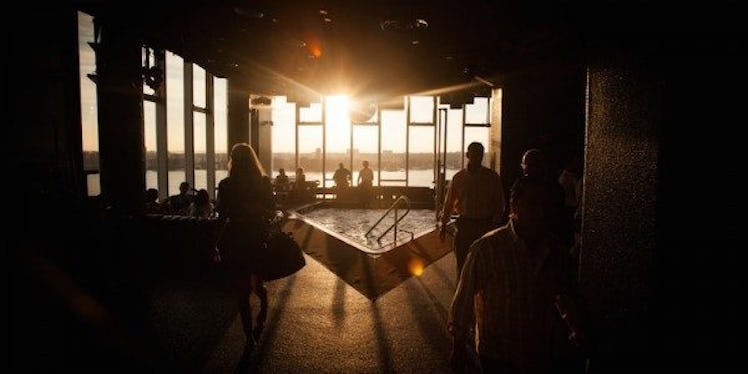
6 Lessons This Generation Learned As Young Children In The Wake Of The 9/11 Tragedy
Who knew that while most of us around the world were carrying on with our lives, more than 2,000 people would be tragically losing theirs?
It could have been any day, anyone. It could have happened anywhere, but it happened on Tuesday, September 11, with nearly 3,000 people among the casualties in Lower Manhattan and in Arlington, VA.
My eyes were glazing over my biology textbook, as I tried to study for Friday's quiz. My teacher flipped on the television. Never did I imagine our classroom watching anything beyond the charming studies of living organisms. I immediately saw it: a tall building on fire.
As oblivious as I was that morning, I speculated that a building was just on fire. It happens on television often, so what's all this hype? Shame on me for questioning its significance.
Little by little, the facts rolled in: It was not just one building, but two. These buildings were not set ablaze due to some possible electrical malfunction, but due to Boeing jets. I learned later that it was not due to negligent pilots; it was terrorism.
A plane should fly in skies, not into buildings.
This marked the pivotal point in many of our lives, when a part of our innocence began to dissipate inside of us. Fear assumed its place and our minds ran freely, questioning everything. Life threw a curve ball, and I was at moldable age, at the height of my curiosity. I learned. I empathized. I feared and I took these few lessons with me:
1. Crisis can bring people together
Countless heroes were present on the day of the attacks. Many risked their lives for those in danger and did not make it through. After 9/11, many grew very sensitive toward one another.
We appreciated one another more and were aware that devastation can spontaneously occur when we least expect it — whether it's a plane hijacking, a Boston Marathon bombing, a local car accident, a sudden diagnosis of cancer or a movie theater shooting. We befriended our neighbors and said "I love you" more often.
2. Crises can alienate people
While love was more palpable after 9/11, discrimination grew more rampant, too. If you were of Arab-American or Middle Eastern descent, you were seen as a threat. These groups were targeted more in public and were often the object of ridicule.
In addition, following September 11, people grew angrier. Security grew tighter. Many became cynical. Some grew doubtful. Others developed conspiracies. While the rest of us sought comfort from peers, many tried to divert themselves from others.
3. Life is precious
It sure is. It is unfair, too. Every day is a new day that will never be again. It will never be September 11, 2001 again, nor will it ever be this day. We have been dying since birth, but we learn to live, laugh and smile a little more and take care of ourselves and each other a little better.
4. Terrorism is real and not close to disappearing... if it ever will
Terrorism is real. If you don't read, watch or hear about it, it's still happening. There are dreadful things happening outside our backyards.
While many of us complain about trivial first-world problems, it is not until a moment like September 11 happens that we will wake up and realize that our issues are incomparable to the thousands of fatalities or awakening reminders that we are at war.
As long as there is diversity in our skin color, religion, politics, ethnic backgrounds or social status, there will always be war — and terrorism is the dawn of that.
5. Accepting our fate
Death is an extremely grim notion to take in and accept. When we hear the terrible news of people losing their loved ones, especially those who are close to us, it hits closer to home. Not knowing when your last moments are coming is a troubling thought.
No one understands the horrific episodes that took place inside of the World Trade Center or on the aircrafts — the looks on the passenger faces or the sound of their cries. We can only imagine it. Even that haunts us.
When we become acquainted with a moment like September 11, it prompts us to feel like we have to prepare ourselves for daunting moments.
6. Fine line between being a realist and optimist
Post-9/11, we found ourselves struggling to see things optimistically or realistically. Should we continue living our lives, trying to be better examples of humanity? Or, should we conform to society in order to survive?
Is being prejudiced acceptable and normal because it’s a natural feeling, considering it has been a byproduct of today's current events? Should I accept that when I walk into a room full of people, I will be judged because of my ethnic background? Or, should I convince those who are judging otherwise?
TSA has singled me out from the rest of the passengers for whatever reason. Should I be upset because I am targeted or shrug it off because they are just practicing safety?
We all have initial reactions, but we neglect to take a moment to breathe. We end up learning that it is necessary to carry our lives, balancing both realism and optimism.
Whether we were at school that day, arguing with a spouse at home or at an airport awaiting departure, it was happening. While we may not mourn every day for those who left us on 9/11, we will never forget. We will never deny it as something that shaped us into whom we have become.
We will continue to try to do our best as people and as a community.
Photo Credit: Getty Images